Kuhle Wampe or Who Owns the World? is a film of genre Drama directed by Slátan Dudow released in USA on 23 april 1933 with Ernst Busch
Kuhle Wampe or Who Owns the World? (1932)
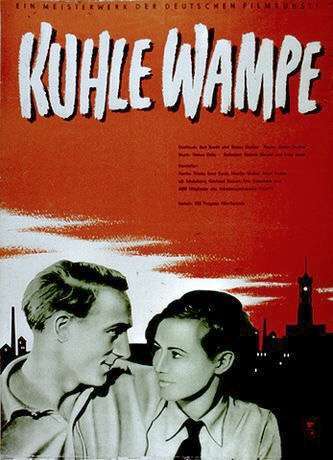
If you like this film, let us know!
Kuhle Wampe (full title: Kuhle Wampe, oder: Wem gehört die Welt?, released in English as Kuhle Wampe or Who Owns the World?) is a 1932 German feature film about unemployment and left wing politics in the Weimar Republic. The script was conceived and written by Bertolt Brecht. He also directed the concluding scene: a political debate between strangers on a train about the world coffee market. The rest of the film was directed by Slatan Dudow. The film music was composed by Hanns Eisler.
Kuhle Wampe itself was a tent camp on the Müggelsee in Berlin. Wampe is Berlin dialect for "stomach", so the title could be rendered "Empty Stomach".
The film was banned in 1932 under the accusation that it depicted the president, the legal system, and religion in a poor way, but due to protests the ban was lifted on a recut version. The film remained unseen for many years after the Second World War. However, a restored print is now available and a video was released by the British Film Institute in 1999, along with a documentary video essay on the original film by Andrew Hoellering, son of the film's producer George Hoellering.
Synopsis
Kuhle Wampe takes place in early-1930s Berlin. The film begins with a montage of newspaper headlines describing steadily-rising unemployment figures. This is followed by scenes of a young man looking for work in the city and the family discussing the unpaid back rent. The young man, brother of the protagonist Anni, removes his wristwatch and throws himself from a window out of despair. Shortly thereafter his family is evicted from their apartment. Now homeless, the family moves into a garden colony of sorts with the name “Kuhle Wampe.”Actors

Ernst Busch
(Fritz)

Hertha Thiele
(Anni)

Adolf Fischer
(Kurt)

Gerhard Bienert
(Zeitungsleser)
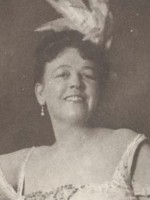
Anna Müller-Lincke
(Sängerin)
Comments
Leave comment :
Suggestions of similar film to Kuhle Wampe or Who Owns the World?
There are 12 films with the same actors, 6 films with the same director, 61812 with the same cinematographic genres, 7796 films with the same themes, to have finally 70 suggestions of similar films.If you liked Kuhle Wampe or Who Owns the World?, you will probably like those similar films :
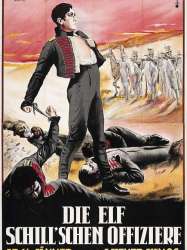
Schill's eleven officers (1932)
, 1h41Origin German
Genres Drama, War, Historical
Themes Political films, Histoire de France, Napoleonic Wars films, French Revolution films
Actors Friedrich Kayßler, Hertha Thiele, Hans Brausewetter, Veit Harlan, Camilla Spira, Carl de Vogt
Rating55%





Le film décrit le soulèvement raté de soldats prussiens menés par Ferdinand von Schill contre l'armée d'occupation napoléonienne et se focalise essentiellement sur les officiers de Ferdinand von Schill qui furent exécutés à Wesel.
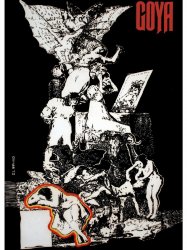 , 2h16
, 2h16Directed by Konrad Wolf
Genres Drama, Historical
Themes Political films, Napoleonic Wars films, French Revolution films
Actors Donatas Banionis, Ernst Busch, Olivera Katarina, Fred Düren, Tatyana Lolova, Wolfgang Kieling
Rating70%





Elevé au rang de peintre fétiche de la cour du roi Charles IV d'Espagne, Francisco de Goya jouit d'une excellente réputation. S'il a foi dans l'Eglise et la royauté, Goya est aussi un patriote d'origine modeste, attaché au peuple. Homme de contradictions, il nourrit une passion dévorante pour la duchesse Alba, tout en désapprouvant sa morgue aristocratique. Goya traduit ces états d'âme dans des oeuvres singulières, qui paraîtront plus tard d'une grande modernité. A mesure qu'avance son «apprentissage» politique, ses toiles perdent leurs couleurs chatoyantes pour aborder un univers plus sombre et plus radical, jusqu'à s'attirer les foudres du Grand Inquisiteur...

Battle at Bloody Beach (1961)
, 1h20Origin USA
Genres Drama, War
Themes Seafaring films, Transport films, Political films
Actors Audie Murphy, Gary Crosby, Dolores Michaels, Ivan Dixon, Alejandro Rey, Marjorie Stapp
Rating54%





Craig Benson (Audie Murphy) is a civilian working for the Navy helping supply guerrilla insurgents in the Philippines. His main purpose, however, is to find his wife Ruth (Dolores Michaels), from whom he was separated by the Japanese invasion of the Philippines. When he does find her, he learns that she believed him killed and is romantically involved with a Filipino resistance leader, Julio Fontana (Alejandro Rey).

Xiu Xiu: The Sent-Down Girl (1998)
, 1h39Directed by Joan Chen
Genres Drama
Themes Feminist films, Political films
Actors Wang Luoyong
Rating74%





Xiu Xiu (Chinese: 秀秀), a 15-year-old girl living in the city of Chengdu, moves out to study horses in the countryside with a nomadic Tibetan. She is told that after six months, she will return to take charge of her all-girl cavalry unit. Her only friend is the eunuch horseman, Lao Jin, who takes care of her while teaching her to herd horses. However after the six months are up she quickly discovers that she is not returning.
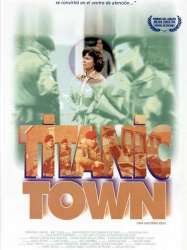
Titanic Town (1998)
, 1h40Directed by Roger Michell
Origin United-kingdom
Genres Drama
Themes Films about terrorism, Political films
Actors Julie Walters, Ciarán Hinds, Ciarán McMenamin, Oliver Ford Davies, Nicholas Woodeson, Lorcan Cranitch
Rating63%






A Time for Defiance (1998)
, 2h4Directed by Antonio Mercero
Genres Drama, War, Romance
Themes Political films
Actors Gabino Diego, Leonor Watling, Adriana Ozores, Héctor Colomé
Rating65%





In Madrid, during the bombing of November 1936, in the Spanish Civil War, the Republican Government decided on the evacuation of paintings from the Prado Museum. Manuel (played by Gabino Diego), a 28-year-old security guard, finds a self-portrait of Goya abandoned in one corner. He hides the painting and flees the bombing of his house.
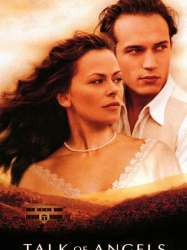
Talk of Angels (1998)
, 1h36Directed by Nick Hamm
Origin USA
Genres Drama, War, Romance
Themes Political films
Actors Polly Walker, Vincent Pérez, Franco Nero, Marisa Paredes, Penélope Cruz, Frances McDormand
Rating58%





Dans les années 30, en Espagne, une jeune femme d'origine irlandaise tombe amoureuse d'un homme marié, qui lutte contre le régime de Franco.
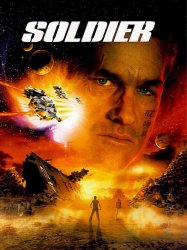
Soldier (1998)
, 1h39Directed by Paul W.S. Anderson
Origin USA
Genres Drama, Science fiction, War, Fantasy, Action, Adventure
Themes Space adventure films, Monde imaginaire, Sur une planète fictive, Films based on science fiction novels, Films set in the future, Political films, Dystopian films, Space opera
Actors Kurt Russell, Jason Scott Lee, Connie Nielsen, Michael Chiklis, Gary Busey, Sean Pertwee
Rating60%





In 1996, as part of a new military training program, a group of orphaned infants are selected at birth and raised as highly disciplined soldiers with no understanding of anything but military routine. They are trained to be ruthless professionals, and all those considered to be physically or mentally unworthy are executed. The survivors are turned into ultimate fighting machines, but have no understanding of the outside world.

Shadow of Doubt (1998)
, 1h43Directed by Randal Kleiser
Origin USA
Genres Drama, Thriller, Crime
Themes Political films
Actors Melanie Griffith, Tom Berenger, Craig Sheffer, Huey Lewis, Wade Dominguez, James Morrison
Rating51%





After the daughter of a prominent businessman is brutally murdered, high profile defense attorney Kitt Devereux takes the case of the accused murderer, rapper Bobby Medina. With a history of drugs and violence, Medina is a likely suspect, but Devereux suspects there's more to the case as she locks horns with her ex-husband, D.A. Jack Campioni, and a wealthy woman whose son is a presidential candidate. Dealing with her own tainted past and the unreliable Medina, Devereux struggles to prove her client's innocence even to herself.

Savior (1998)
, 1h43Directed by Predrag Antonijević
Origin USA
Genres Drama, War, Historical
Themes French war films, Transport films, Political films, Road movies
Actors Dennis Quaid, Stellan Skarsgård, Nastassja Kinski, Nataša Ninković, Sergej Trifunović, Nebojša Glogovac
Rating71%





Joshua Rose (Dennis Quaid), a State Department Official on embassy duty in Paris, sees his wife (Nastassja Kinski) and son killed in a bombing by suspected Islamic terrorists. Immediately after the family funeral he storms into a nearby mosque and shoots several worshipers. His friend Peter (Stellan Skarsgård) is forced to shoot one of the survivors when the man tries to kill Rose, and in order to avoid arrest they join the French Foreign Legion, with Joshua taking the name Guy.
 Connection
Connection